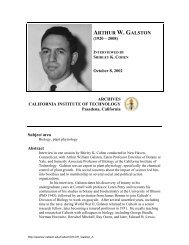Interview with David Baltimore - Caltech Oral Histories
Interview with David Baltimore - Caltech Oral Histories
Interview with David Baltimore - Caltech Oral Histories
You also want an ePaper? Increase the reach of your titles
YUMPU automatically turns print PDFs into web optimized ePapers that Google loves.
<strong>Baltimore</strong>-20<br />
LIPPINCOTT: How big a program was that Were there quite a few students in it<br />
BALTIMORE: Oh, I don’t remember, but it was maybe a dozen students.<br />
LIPPINCOTT: You had to apply<br />
BALTIMORE: You had to apply—but this was a wonderful story: Here I am now, a junior in the<br />
honors program at Swarthmore, in biology. The honors program at Swarthmore was this<br />
fabulous program where you met once a week <strong>with</strong> the other students in the seminar for two<br />
years, and at the end of two years you had an exam on everything you’d done over those two<br />
years. And then it was decided whether you would graduate <strong>with</strong> honors, high honors, or highest<br />
honors—sort of like at Oxford. About half the students were in honors. The program is nowhere<br />
near as lovely as it was then because the world has changed. But this was remarkable. And then<br />
the people who examine you are outside examiners. Howard Temin is famous for his honors<br />
exam, among other things, because he walked in the room, sat down on the table in the room and<br />
said to the examiners, “You’re the most prestigious group of people we’ve had at Swarthmore. I<br />
have some questions for you.” [Laughter] Another famous thing about Howard is that he had<br />
read everything in the Swarthmore library and they had to buy books to keep him busy.<br />
LIPPINCOTT: Is that true<br />
BALTIMORE: I don’t know if it’s true or not.<br />
LIPPINCOTT: Sounds apocryphal.<br />
BALTIMORE: Yes, it sounds apocryphal, and there are certainly books in there he wouldn’t have<br />
read. Anyway, the honors program was a fabulous program; it allowed you really to develop<br />
independent education. So we were able to take these seminars into directions where the faculty<br />
had no idea what we were talking about, because we were going off and reading journals in<br />
Haverford and Bryn Mawr, and reading review articles. And we would come in <strong>with</strong> questions,<br />
and these guys would look at us and say, “You know, we have no idea. Go out and read<br />
something more and decide for yourself what’s right.”

















